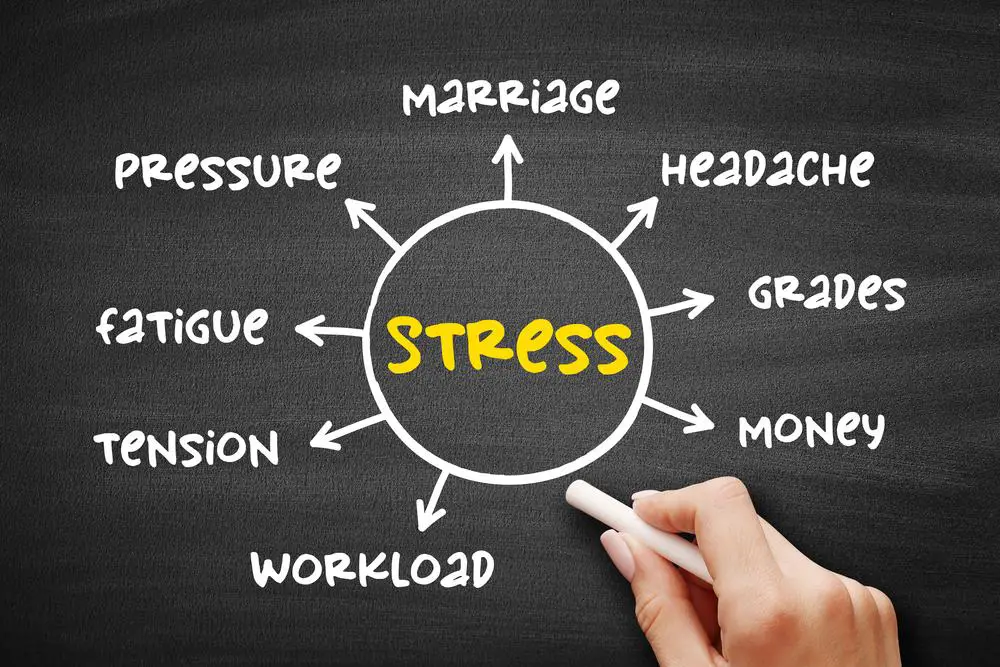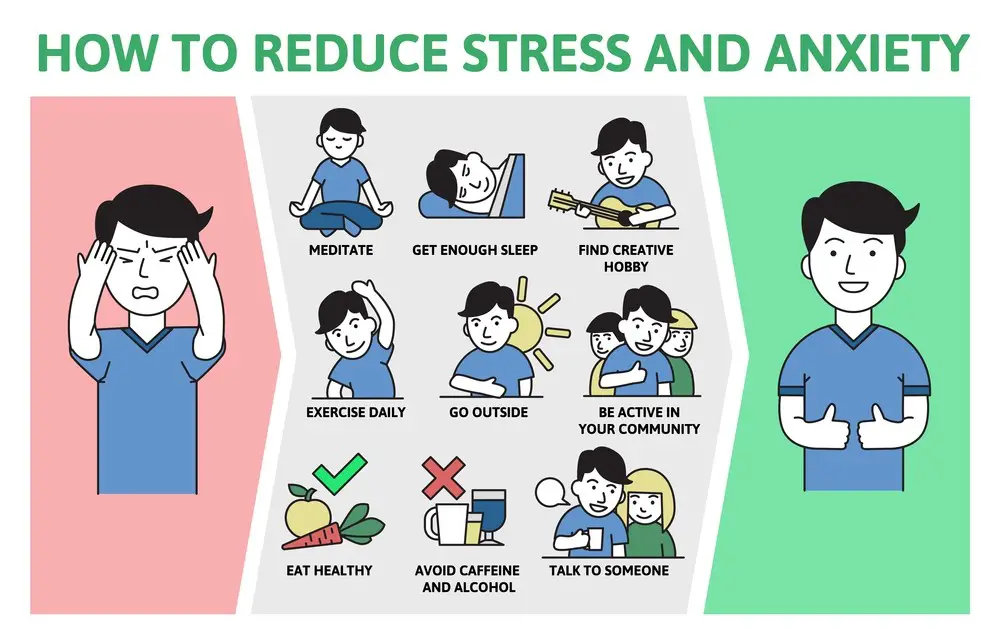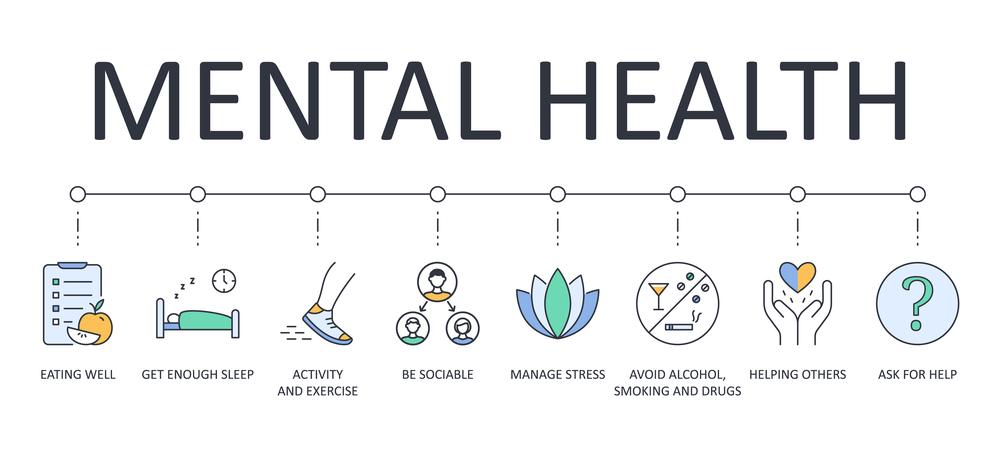As a BetterHelp affiliate, we receive compensation from BetterHelp if you purchase products or services through the links provided
If you’ve ever felt the onset of a pounding headache as your stress levels climb, you’re not alone. Many people wrestle with throbbing migraines that seem inextricably linked to their busiest, most stressful days.
It’s natural to wonder: can the pressures of life bring on these painful episodes? You may feel like your head is caught in a vice whenever deadlines loom, or personal challenges arise.
This article delves into the tangled relationship between stress and headaches, offering strategies for managing both. You’ll discover ways to identify triggers, reduce tension, and find balance in your busy life to keep those debilitating migraines at bay.
Ready to reclaim calmness and conquer those headaches? Read on!
The Link Between Stress and Migraines
 You’ve likely heard murmurs around the water cooler or during a yoga class about how stress can trigger those dreaded migraines. But have you ever wondered what the science says?
You’ve likely heard murmurs around the water cooler or during a yoga class about how stress can trigger those dreaded migraines. But have you ever wondered what the science says?
Let’s delve into the connection between your hectic schedule and that pounding in your head to uncover why, when life cranks up the pressure, your migraines might be kicking into overdrive, too.
The Relationship Between Stress and Migraines
Scientists have been studying the connection between stress and migraines for years. Their findings point to a complex relationship where stress doesn’t just trigger migraines but can also make them worse.
For instance, a 2006 study showed that massage therapy not only helps prevent migraine attacks but also reduces cortisol levels, which are associated with stress, and decreases feelings of anxiety.
This research underscores the importance of managing stress as a way to tackle chronic migraine pain effectively.
Other studies reveal that emotional stress is more than just an inconvenience; it can set off honest physical reactions in your body, leading to migraine symptoms.
Trouble sleeping, muscle tension, and even certain behaviors like overthinking or consuming too much caffeine and alcohol because of anxiety all contribute to increasing the likelihood of experiencing a migraine episode.
Symptoms of Stress and Migraines
Stress and migraines share many common symptoms, indicating a strong connection.
People under stress often experience tension headaches and pain. Chronic stress can make the head and neck muscles tighten and spasm, leading to migraine pain. Stress also impacts hormones and neurotransmitters like serotonin, which play a role in migraines.
In addition, stress causes similar pre-migraine symptoms like fatigue, mood changes, anxiety, and trouble concentrating. The stress hormone cortisol may also act as a trigger for some migraine sufferers.
Overall, ongoing stress places a physical burden on the body that can activate the pain pathways involved in migraines. Managing stress and having healthy coping mechanisms become important for reducing migraine frequency and severity in those prone to both anxiety and migraines.
Understanding the Migraine-Stress Connection
 To fully grasp the migraine-stress connection, it’s essential to understand the biological processes underpinning both conditions.
To fully grasp the migraine-stress connection, it’s essential to understand the biological processes underpinning both conditions.
Stress, particularly chronic stress, activates the body’s “fight or flight” response, affecting various physiological systems. This response involves the release of stress hormones, such as cortisol and adrenaline, which can directly or indirectly trigger migraine attacks.
The body’s reaction to stress can lead to changes in blood flow, muscle tension, and neurotransmitter levels, all of which play critical roles in the onset of migraines.
For example, elevated cortisol levels can influence the dilation and constriction of blood vessels in the brain, a key factor in migraine headaches. Furthermore, stress can disrupt sleep patterns and dietary habits, exacerbating migraine triggers.
Understanding this connection is crucial for individuals prone to migraines. By acknowledging the impact of stress on their condition, they can adopt targeted strategies to manage stress and mitigate its effects on their health.
This might include stress-reduction techniques such as mindfulness, exercise, adequate sleep, and possibly professional counseling to address underlying issues contributing to stress and anxiety.
Recognizing and managing stress is not just about improving mental health; it’s a vital component of a comprehensive approach to reducing the frequency and severity of migraines.
Managing Stress to Reduce Migraine Attacks
 Taking control of your stress levels can be a game-changer when it comes to fending off migraine attacks. It’s about learning the art of balance, recognizing the warning signs your body sends you, and taking proactive steps toward maintaining a calm and composed lifestyle for the sake of your head.
Taking control of your stress levels can be a game-changer when it comes to fending off migraine attacks. It’s about learning the art of balance, recognizing the warning signs your body sends you, and taking proactive steps toward maintaining a calm and composed lifestyle for the sake of your head.
Identifying and Avoiding Triggers
For those prone to stress-induced migraines, identifying and avoiding triggers is key to prevention.
Keep a migraine journal to track symptoms and note what stresses or situations preceded the migraine. Look for patterns around work, family obligations, finances, or other stressors. This can pinpoint your unique triggers.
Once identified, take steps to manage stressors and reduce their impact—practice stress relief techniques like meditation, exercise, or massage. Improve time management and set boundaries when possible. Consider counseling for long-term stressors.
Prioritizing Self-care and Relaxation
 When stress is a migraine trigger, self-care and relaxation become essential.
When stress is a migraine trigger, self-care and relaxation become essential.
Make time each day for soothing activities like a warm bath, light yoga, or reading. Even 10-15 minutes of stillness can relieve stress. Keep stress balls, essential oils, or other tools on hand for quick relaxation.
Practice mindfulness techniques to calm the mind and body. Meditation, visualization, and deep breathing exercises help reduce cortisol and muscle tension tied to migraines.
Schedule regular massages, vacation days, and other respite activities. It’s crucial to listen to your mind and body by slowing down and taking breaks from stress as needed.
By making self-care and stress relief a priority in your routine, you can better manage stress before it results in a painful migraine attack.
Building a Support System
 Creating a strong support system can be crucial for managing stress and reducing the frequency of migraine attacks. Reach out to friends and family, or even join a support group where you can share experiences and strategies with others who understand what you’re going through.
Creating a strong support system can be crucial for managing stress and reducing the frequency of migraine attacks. Reach out to friends and family, or even join a support group where you can share experiences and strategies with others who understand what you’re going through.
Surrounding yourself with understanding people provides emotional comfort, which is essential in times of need. A good support network also reminds you that you’re not alone in your struggle against migraines.
Consider professional help as part of your support system as well. Consulting with healthcare providers specialized in headache treatment and stress management can offer guidance on effective coping mechanisms.
Tips for Preventing Stress-Induced Migraines
If you get migraines when stressed, taking preventive steps is vital.
Start by identifying your stress triggers and finding healthy ways to mitigate them. Therapy, meditation, exercise, and time management can help. Communicate needs and set boundaries around obligations.
Practice relaxation techniques daily, even when not stressed. Deep breathing, yoga, massage, and mindfulness keep stress from accumulating. Maintain good sleep habits and don’t skip meals, as irregular schedules can be stressors.
With some lifestyle adjustments and awareness of stress, managing migraines becomes more achievable.
Coping with Stress-Related Migraine Symptoms
To manage your stress-related migraine symptoms, try adopting relaxation techniques that resonate with you. Deep breathing exercises, meditation, and yoga can help calm the mind and reduce body tension.
These practices provide immediate relief and contribute to long-term stress management when incorporated regularly into your routine.
Consider scheduling regular massage therapy sessions as well. Massage therapy can lower cortisol levels—the body’s main stress hormone—and alleviate muscle strain that often goes hand-in-hand with anxiety-induced migraines.
Exploring Stress Management Techniques for Migraine Relief
When stress is a migraine trigger, stress management is critical for pain prevention.
Techniques like meditation, deep breathing, and mindfulness help calm the mind and body to reduce migraine-causing stress. Even 10-15 minutes per day can make a difference. Yoga promotes relaxation while improving the strength and flexibility of neck and shoulder muscles prone to tension.
Massage therapy relieves muscle tightness and spasms while lowering stress hormones. Acupuncture can have similar relaxing effects by releasing endorphins. Maintaining healthy sleep, diet, and exercise also helps minimize stress.
Stress and Migraines: Breaking the Cycle
Breaking free from the relentless cycle of stress and migraines requires a proactive approach. You don’t have to let stress be the trigger that sets off your next headache. Start by identifying what causes tension in your life and try to avoid these triggers whenever possible.
Regular exercise, adequate sleep, and mindfulness practices like meditation can form a strong foundation for managing stress before it leads to migraine pain.
Consider seeking counseling if you feel overwhelmed; talking to a professional can offer new strategies for coping with life’s pressures and thus reduce the frequency of migraine episodes.
Finding Balance: Stress Reduction for Migraine Sufferers
Adopting stress reduction techniques becomes crucial in maintaining mental equilibrium and keeping headaches at bay. One powerful method is developing mindfulness practices that allow you to become more aware of your body’s responses to stress and nip migraine triggers in the bud before they escalate.
Incorporate regular exercises like yoga or light jogging into your routine, promoting overall well-being and acting as a natural stress reliever. Balance these physical activities with adequate rest; prioritizing good sleep hygiene is essential for migraine prevention.
Dealing with migraines can feel overwhelming, but understanding the stress-migraine connection empowers you to take control. Start by recognizing your triggers and implementing relaxation techniques.
Remember, minor lifestyle adjustments can make a big difference in reducing headache frequency. Seek out support; you’re not alone in this battle. Embrace the journey toward better health, one step at a time.
Navigating the Storm: Understanding Stress-Induced Migraines
Stress-induced migraines are more than just headaches; they are a physical manifestation of the body’s response to overwhelming stress. This section explores the signs that indicate when these migraines are a serious concern and the steps one can take toward relief and management.
- Recognizing the Signs: It’s crucial to understand when a stress-induced migraine is a signal of a deeper problem. If migraines become frequent, severely debilitating, or are accompanied by symptoms like visual disturbances or nausea, it’s time to seek professional help. These indicators suggest that your body is under significant stress and requires more than over-the-counter remedies.
- When to Take Medication: For those moments when a migraine strikes, medication can be a necessary relief. Over-the-counter pain relievers may suffice for occasional migraines, but if you find yourself reaching for them more often than not, consult with a healthcare provider. They may prescribe medication that can prevent migraines or stop them once they start, addressing both the symptoms and their stress-related causes.
- When to Get Counseling: If stress is the root cause of your migraines, medication alone may not be enough. Counseling or therapy can be instrumental in teaching you coping mechanisms to manage stress before it triggers a migraine. Cognitive-behavioral therapy (CBT), in particular, is effective in managing stress and could reduce the frequency and severity of stress-induced migraines.
- Setting Goals: Managing stress-induced migraines involves setting realistic, achievable goals for stress management and migraine prevention. This could include lifestyle changes, such as incorporating relaxation techniques, improving sleep hygiene, or establishing a regular exercise routine. Setting these goals helps create a structured plan for reducing the frequency of migraines.
- Recognizing Progress: Every step forward is progress, even if migraines don’t disappear overnight. Acknowledging and celebrating small victories, like reducing migraine frequency or severity, can motivate continued effort toward stress management and overall well-being.
- 7 Ideas to Help You Relax and Unwind on a Family Vacation - April 27, 2025
- How Having Cybersecurity Protection Helps You Relax - April 25, 2025
- 8 Reasons Why Spending Time Outside Calms You Down - April 25, 2025
This site contains affiliate links to products. We will receive a commission for purchases made through these links.



